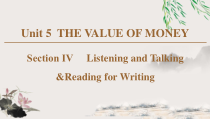 PPT
PPT
【文档说明】19-20 Unit 5 Section Ⅳ Listening and Talking &Reading for Writing-人教版(2019)高中英语必修第三册.ppt,共(50)页,2.751 MB,由小喜鸽上传
转载请保留链接:https://www.ichengzhen.cn/view-119394.html
以下为本文档部分文字说明:
Unit5THEVALUEOFMONEYSectionⅣListeningandTalking&ReadingforWriting栏目导航栏目导航2泛读能初养成技栏目导航栏目导航3阅读Reading2中的材料,选出最佳选项1.Howdidtheclerkstreat
Henryatthebeginning?A.TheytreatedHenryaspolitelyashetreatedothers.B.TheylookeddownuponHenrywhentheynoticedhisappearan
ce.C.Theydecidedtomadeasuittohismeasure.D.TheywantedtoserveHenrytoearnalotofmoney.栏目导航栏目导航42.WhendidtheclerksandtheownerchangetheirattitudetoHenr
y?A.Atthebeginningofthestory.B.Beforetheysawthebanknote.C.Attheendofthestory.D.Aftertheysawthebanknote.栏目
导航栏目导航53.Atthesightofthebanknote,theownerandtheclerksgotvery________.A.frightenedB.angryC.worriedD.shocked答案:1-3BDD栏目导航栏目导航6WordsAndPhras
es知识要点1incase以防;以防万一(教材P54)Incaseithappenstoyouonatripabroad.以防在国外旅行时你也遇到这种事。[例1]Takeanumbrellawithyouincaseitrains.=Takeanumbrellawithyou
incaseofrain.带上伞以防下雨。栏目导航栏目导航7[例2]Incaseitrains/Incaseofrain,weshouldgetourbikesinsidethehouse.我们应该把自行车放在屋里,以防下雨。[造句]如果失火,就赶快向最近的门跑。______________
___________________________________Incaseoffire,walkquicklytothenearestdoor.栏目导航栏目导航8[知识拓展]incase以防;万一incaseof万一„„;如果发生„„inanycase无论如何;总之innocase决不
inthat/thiscase如果是那/这样的话;在那/这种情况下asisoftenthecase这是常有的事栏目导航栏目导航9[提示](1)incase可用作连词,引导从句,也可以单独使用,常位于句末,相当于一个副词
。(2)innocase位于句首时,句子用部分倒装。(3)当case作先行词且在定语从句中作状语时,要用where引导定语从句。栏目导航栏目导航10[即学即练](1)用inthatcase,incase,incaseof,asisoftent
hecase填空①(2018·6月浙江卷)Iheldtheropetightly_______Imightfalloff.②____________________withotheroldpeople,mygrandfatherisfondoftalkingaboutgoo
dolddays.③Themeetingwillbeputoff__________therain.④Enoughspaceshouldbegiventothekids.____________,theywillgetmorelifeexperiences.
incaseAsisoftenthecaseincaseofInthatcase栏目导航栏目导航11(2)句式升级Weshouldinnocasedoanythingthatgoesagainsttheinterestsofpeople.→_________________
________________thatgoesagainsttheinterestsofpeople.(倒装句)Innocaseshouldwedoanything栏目导航栏目导航12知识要点2he
sitatevi.犹豫;踌躇;迟疑;顾虑(教材P55)WhydoestheownerthinkHenryhesitatestopaythebill?主人为什么认为享利付账时犹豫了?[例1]Agentlemanpassesandhesitatesforamoment.这时有位先生从这儿路过,他
迟疑了片刻。栏目导航栏目导航13[例2]IfthereissomethingelseIcandoforyou,pleasedon'thesitatetocontactme.如果有其他我可以为你做的,请
毫不犹豫地跟我联系。[造句]我毫不犹豫地接受了这个职位。_____________________________________Ididn'thesitatetoacceptthepost.栏目导航栏目导航14[知识
拓展](1)hesitateabout/oversth.对某事感到犹豫不决hesitatetodosth.对做某事感到犹豫不决don'thesitatetodosth.不要犹豫做某事(2)hesitationn.踌躇;犹豫withouthesitation毫不犹豫地haveno
hesitationindoingsth.毫不犹豫地做某事栏目导航栏目导航15[即学即练]单句语法填空①Shehesitated________(spend)somuchmoneyonsuchadress.②Ididn'thesitateforamoment__________ta
kingthejob.③Hedrivedintotheriverandsavedthedrowningchildwithout__________(hesitate).tospendabout/overhesitation栏目导
航栏目导航16④Sincethen,Ihavenothesitated_____(be)inthepresenceofothers,especiallywhentheyneedcompany.⑤Pleasehavenohesitation__writingtomei
fyouwantmetodosomethingforyouinChina.tobein栏目导航栏目导航17知识要点3permissionn.准许;许可;批准;许可证(教材P58)I'dloveto...withyourpermission.我喜欢„„你的准许。[例1]Whog
aveyoupermissiontoleaveclassearly?谁允许你早退的?[例2]Withyourpermission,Iwillcarryouttheprojectassoonaspossible.如果你答应的话,我
将尽快展开这项计划。栏目导航栏目导航18[造句]你应该知道未经许可不可以给这些展品拍照。__________________________________________________________________________________Youshouldknowthatnoph
otosaretobetakenoftheexhibitswithoutpermitting.栏目导航栏目导航19[知识拓展](1)permitv.许可;允许n.许可证;执照permitsb.todosth.允许某人做某事pe
rmitdoingsth.允许做某事(2)adrivingpermit驾驶执照(3)permissionn.[U]允许;许可with/withoutone'spermission获得某人同意/未经某人允许askforpermission请求允许栏目导航栏目
导航20[联想发散]动词permit的常见用法为:permitdoingsth./sb.todosth.,用法类似的动词还有:①allowdoingsth./sb.todosth.允许(某人)做某事②forbiddoingsth./sb.todosth.禁止(某人)做某事③advisedoing
sth./sb.todosth.建议(某人)做某事④encouragedoingsth./sb.todosth.鼓励(某人)做某事栏目导航栏目导航21[即学即练]单句语法填空①Thepartywillbeheldinthegar
den,weather___________(permit).②Withherparents'__________(permit),shejoinedtheboxingclub.③Anyoneisnotpermitted________(leave)theofficebefore
themeetingisover.permittingpermissiontoleave栏目导航栏目导航22SentencePatterns重点句式1wouldratherdo句式(教材P56)Oh,I'drathernotpayyounow...哦,我宁愿现
在不付给你钱„„句式分析:wouldrather+动词原形,意为“宁愿做某事”栏目导航栏目导航23[例1]Hewouldmuchratherkeeptimeforhishobbies.他宁愿把时间花在自己的爱好上。[例2]Iwou
ldrathertellhimaboutitmyselfthanlethimfindoutfromotherpeople.我宁肯自己把事情告诉他,也不愿他从别人那里得知这件事。[造句]他宁愿给自己取名“吉祥”,代表着“吉祥如意”。_______________________________
_______________________________________He'dratherhehadbeennamed“Jixiang”,meaningbeingluckyandhappy.栏目导航栏目导航24[知识拓展](1)wouldrathe
rdosth.thandosth.woulddosth.ratherthandosth.prefertodosth.ratherthandosth.preferdoingsth.todoingsth.宁愿做某事(而)不愿做某事(2)wouldrather+从句一般过去时,
表示对现在或将来的虚拟过去完成时,表示对过去的虚拟栏目导航栏目导航25[即学即练]单句语法填空①Wouldyourather____(stay)athomeorgoouttohaveapicnicwithus
?②Wewouldratherourdaughter______(stay)athomewithus,butitisherchoice,andsheisnotachildanylonger.③Wewouldrath
er____(make)deliciousdumplingswithourownhandsthan___(buy)someforthem.staystayedmakebuy栏目导航栏目导航26④Iwouldrather__________(laugh)atthanquarrelwith
him.⑤Iwouldratheryou____________(finish)yourhomeworkyesterday.⑥Shewouldratheryou____(come)tomorrowthantoday.⑦Iwouldrather_
____(solve)myproblemsalone,whatevertheymaybe.⑧Aliceisaquietgirl,whoprefers_______(stay)inthelibraryr
atherthangotoseeamovie.belaughedhadfinishedcamesolvetostay栏目导航栏目导航27重点句式2asif句式(教材P56)Thenhefoldsthebillandslowlyunfoldsitagain,asiflookinga
tsomethinghecan'tbelieveisthere.然后他把这张钞票叠上,然后又慢慢地打开,好像在看一件它不相信存在的东西。句式分析:asif“仿佛„„似的,好像„„似的”,也可以用asthough。栏目导航栏目导航28[例1]Hurryup!Itlooksas
ifthetrainisgoingtomove.快点!看起来火车要开了。[例2]Heopenedhismouthasiftosaysomething.他张开嘴好像要说什么。[造句]好像世界末日到了!________________________________________I
fseemedasiftheworldwasatanend!栏目导航栏目导航29[知识拓展](1)如果所引导的从句表示的情况是真实的或是极有可能发生的情况时,句子要用陈述语气。(2)当说话人所陈述的是不真实的或极少可能发生或存在的情况时,从句用虚拟语气。(3)如果asif引导的从句中的主语
和主句的主语相同,且含有be动词,可省略从句主语和be动词,这样asif后就只剩下名词、不定式、形容词(短语)、介词短语或分词。栏目导航栏目导航30[即学即练](1)单句语法填空①ItwasJohnwhobrokethewindow.Whyareyoutalkingtomeasif
I________(do)it?②Whenapencilispartlyputintowater,itlooksasifit___________(break).haddonewerebroken栏目导航栏目导航31(2)完成句子①他说话的样子,好像他知道她在哪里似的。H
etalksasif_______whereshewas.②你看上去好像你刚见了鬼一样。Youlookasif____________aghost.③他那样子就像被雷击了似的。Helooksasifhe______
______bylightning.heknewyouhadseenhadbeenhit栏目导航栏目导航32记叙文之空间顺序——“移步换景”巧解题记叙文中的空间(地点)顺序一般指在同一个时间背景下,不同地点、不同场景发生的事情。“移步换景”是此类记叙文的明显特点,文章中的情节随着地点的更迭变
换而跌宕起伏。因此,此类记叙文中地点多、情节较复杂,阅读此类文章可采用“移步换景”法,即一边阅读、一边标注出在不同地点发生了什么事情,进而从整体上把握全文内容。栏目导航栏目导航33[高考典例]2018·天津卷·B
篇[移步⇨地点更迭变换][换景⇨情节变化发展]地点1[1]WhenIwas17,IreadamagazinearticleaboutamuseumcalledtheMcNay,oncethehomeofawatercoloristnamedM
arianMcNay.Shehadrequestedthecommunitytoturnitintoamuseumuponherdeath.OnasunnySaturday,SallyandIdroveovertothemuseum.She
asked,“Doyouhavetheaddress?”“No,butI'llrecognizeit,therewasapictureinthemagazine.”[2]“Oh,stop.Thereitis!”换景1:鲁莽之行——地点1作者读到一篇文章,于是急匆匆地和好友一
起去找杂志中提到的博物馆。(可解第41题)栏目导航栏目导航34地点2[3]Themuseumwasfree.Weentered,excited.Agroupofpeoplesittinginthehallstoppedtalkin
gandstaredatus.[4]“MayIhelpyou?”amanasked.“No,”Isaid.“We'refine.”Tourguidesgotonmynerves.Whatiftheytalkedalongtimeaboutapaintingyouweren'tthatinte
restedin?Sallyhadgoneupstairs.Thepeopleinthehallseemedverynosy(爱窥探的),keepingtheireyesonmewithcuriosity.Whatwastheirproble
m?换景2:不速之客——地点2作者到达“博物馆”,“馆“内有人。栏目导航栏目导航35地点3Isawsomenicesculpturesinoneroom.SuddenlyIsensedamanstandingbehindme.“Wheredoyouthinkyouare?”he
asked.Iturnedsharply.“TheMcNayArtMuseum!”Hesmiled,shakinghishead.“Sorry,theMcNayisonNewBraunfelsStreet.”“What'
sthisplace?”Iasked,stillconfused.“Well,it'sourhome.”My换景3:懵懂之中——地点3、4作者发现自己弄错了地方,来到了别人的家里。(可解第42、43题)栏目导航栏目导航
36地点4heartjolted(震颤).Iracedtothestaircaseandcalledout,“Sally!Comedownimmediately!”换景4:尴尬离开——地点5、6作者尴尬地和女主人搭讪,并呼唤好友下楼,出去之
后告诉了好友发生的事。栏目导航栏目导航37地点5地点6[5]“There'ssomereallygoodstuff(艺术作品)upthere.”Shesteppeddown,lookingconfused.Ipushedhertowardthefrontdoor,wavingatt
hefamily,saying,“Sorry,pleaseforgiveus,youhaveareallyniceplace.”Outside,whenItoldSallywhathappened,s
hecoveredhermouth,laughing.Shecouldn'tbelievehowlongtheyletuslookaroundwithoutsayinganything.换景5:心仪之地——地点7作者找到了真正的博物馆,看到
了名家名作,但却感到不安。(可解第44题)栏目导航栏目导航38地点7[6]TherealMcNaywassplendid,butwefeltnervousthewholetimewewerethere.VanGogh,Picasso.Thistime,westayedtogether,
incaseanythingelseunusualhappened.换景5:心仪之地——地点7作者找到了真正的博物馆,看到了名家名作,但却感到不安。(可解第44题)栏目导航栏目导航39地点8[7]Thirtyyearslater,awomanapproac
hedmeinapublicplace.“Excuseme,didyoueverenteraresidence,longago,thinkingitwastheMcNayMuseum?”换景6:事后回顾—
—地点830年之后作者偶遇一位女性,对方提到作者的那次经历。栏目导航栏目导航40地点9[8]“Yes.Buthowdoyouknow?Wenevertoldanyone.”[9]“Thatwasmyhome.Iwasateenagersittingint
hehall.Beforeyoucameover,IneverrealizedwhatabeautifulplaceIlivedin.Ineverfeltluckybefore.Youthoughtitwasamuseum.Myfeelingsaboutmyhomechange
dafterthat.I'vealwayswantedtothankyou.”换景7:无心插柳——地点9作者那次鲁莽之行,改变了当时小女孩对家的感情。(可解第45题)栏目导航栏目导航41[定区间·细比对]41
.WhatdoweknowaboutMarianMcNay?A.Shewasapainter.B.Shewasacommunityleader.C.Shewasamuseumdirector.D.Shewasajournalist
.栏目导航栏目导航4242.Whydidtheauthorrefusethehelpfromthemaninthehouse?A.Shedislikedpeoplewhowerenosy.B.Shefeltnervouswhentalkingtostranger
s.C.Sheknewmoreaboutartthantheman.D.Shemistookhimforatourguide.栏目导航栏目导航4343.Howdidtheauthorfeelaboutbeingstaredatbyth
epeopleinthehall?A.Puzzled.B.Concerned.C.Frightened.D.Delighted.栏目导航栏目导航4444.WhydidtheauthordescribetherealMcNaymuseum
injustafewwords?A.Therealmuseumlackedenoughartworktointeresther.B.Shewastooupsettospendmuchtimeattherealmuseum.C.TheMcNaywasdisappointingcomp
aredwiththehouse.D.Theeventhappeninginthehousewasmoresignificant.栏目导航栏目导航4545.Whatcouldwelearnfromthelastpa
ragraph?A.Peopleshouldhavegoodtastetoenjoylife.B.Peopleshouldspendmoretimewiththeirfamily.C.Peopletendtobeblindtothebeautyaroundthem.D.Peopletendtoed
ucateteenagersatamuseum.栏目导航栏目导航4641.由题干中的关键词MarianMcNay定位到第一段。根据“换景1”中的“awatercoloristnamedMarianMcNa
y“可知,MarianMcNay是一位painter(画家)。42.由题干中的关键词inthehouse可定位到第四段。根据“换景3”中的“Tourguidesgotonmynerves.(导游让我紧张)”可知,“我”把那个人误认为是导游了。栏目导航栏目导航4743.
由题干中的关键词inthehall可定位到第四段。根据“换景3”中“我”被那些人盯着时的疑惑“Whatwastheirproblem?”及后文中的“stillconfused”可知,“我”感到很困惑(puzzled)。
栏目导航栏目导航4844.由题干中的关键词therealMcNaymuseum可定位到第六段。根据“换景5”可知,作者和朋友来到真正的McNay博物馆,但是她们一直觉得紧张,害怕又出现先前那种不同寻常的事,由此推断,作者不是重点描述McNay博物馆,而是描述这次突
发事件带来的影响。栏目导航栏目导航4945.由题干中的关键词定位到最后一段,从“换景7”中那位女士的话“在你造访之前,我从未意识到我住的是个多么美丽的地方”可推知,人们往往对自己身边的美丽视而不见。[答案]41-45ADADCThankyouforwatching!
 辽公网安备 21102102000191号
辽公网安备 21102102000191号
 营业执照
营业执照